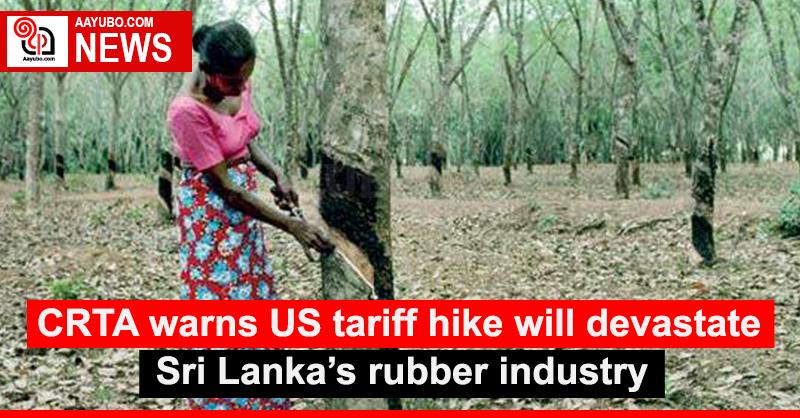CRTA warns US tariff hike will devastate Sri Lanka’s rubber industry

The Colombo Rubber Traders Association (CRTA) joined the bandwagon in expressing deep concern about the recent imposition of a 44 percent blanket tariff by the United States on all imports from Sri Lanka and said it is particularly worried on the “devastating impact” it would have on Sri Lanka’s natural rubber industry.
As one of the country’s key export sectors, the natural rubber industry contributes significantly to both employment and foreign exchange earnings. Since the present tariff is 12.5 percent, the additional 44 percent will raise the total tariff to 56.5 percent, making Sri Lankan rubber exports highly uncompetitive in the US market.
“This is expected to have a far-reaching impact on the rubber tappers, their families and Sri Lanka’s broader economy,” the CRTA said.
The natural rubber sector in Sri Lanka supports over 150,000 rubber tappers/harvesters, most of whom work in rural areas. The association pointed out that these workers, along with their families, depend on the industry for their livelihoods. Moreover, the rubber industry encompasses a diverse range of businesses, from small-scale plantations to large-scale exporters, all playing a vital role in the sector’s growth and sustainability.
The 56.5 percent tariff imposed by the United States has made Sri Lankan rubber exports increasingly uncompetitive, threatening to reduce demand for Sri Lankan rubber in this key market.
In 2023 and 2024, Sri Lanka’s natural rubber exports to the United States were valued at US $ 1.2 million. In comparison, exports in 2022 amounted to US $ 1.9 million, highlighting a notable contribution to the country’s foreign exchange earnings. However, the implementation of this tariff is expected to further erode the competitiveness of Sri Lankan rubber in the US market, leading to a continued decline in export revenue.
“The consequences of this tariff extend beyond just the rubber sector. The rubber tappers, who form the backbone of the industry, face the prospect of losing their jobs as companies struggle to compete.
Many tappers live in rural communities where alternative employment opportunities are limited and their families depend on the income generated from rubber tapping. A downturn in the industry could lead to an economic crisis in these areas, where the rubber trade has been a reliable source of income for decades,” the CRTA said.
The CRTA said it firmly believes that with prompt action from the government and effective collaboration between the private and public sectors, Sri Lanka can mitigate the impact of this tariff.
“We are at a critical juncture and immediate action is essential. By collaborating with the government, the CRTA is committed to finding sustainable solutions that will protect the interests of the rubber industry, safeguard jobs and maintain the vital foreign exchange earnings that this sector contributes to our economy,” said CRTA Chairman Harin de Silva.
130 Views







Comments